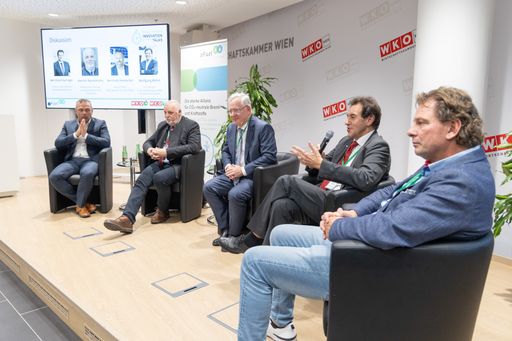The fifth edition of the “Energy Transition Innovation Talks” examined the question of what steps are necessary to achieve the energy transition in transport as quickly as possible. Stephan Schwarzer, Managing Director of the eFuel Alliance Austria, once again invited a top-class group of experts to find viable answers to the upcoming challenges surrounding a rapid mobility transition. This time the transport and traffic division and the freight transport specialist group of the Vienna Chamber of Commerce were involved as partners.
Bernhard Geringer, emeritus director of the Institute for Vehicle Drives and Automotive Technology at the Vienna University of Technology, has a clear answer: “There is no such thing as one-fits-all. The decisive factor for environmentally friendly mobility is sustainable energy and not the type of drive. We therefore need openness to technology and climate-neutral solutions from which we can choose depending on needs and applications.” The efficiency of the engine is also of secondary importance if the electricity for the electric car does not come from its own solar system on the roof, but rather is fed into the general power grid by a thermal power plant. Therefore, the usual efficiency comparisons are not a useful basis for decision-making.
Jürgen Roth, CEO of the eFuel Alliance Austria, is also in favor of a technology mix: “We want to work together. You can’t pull a carriage up a steep mountain with a single horse. It takes two horses to get to the top quickly and safely.” Here Roth also holds politicians accountable: “Those in charge must finally admit that they have caused serious damage to the economy by making their decisions based on false assumptions and made outdated assumptions.
Suspend horrendous penalties from weakened automobile manufacturers
“Since then there has been war, recession, slumps in the car industry, penetration of Chinese car brands with a small share of Austrian suppliers. I therefore welcome the initiative of Economics Minister Kocher, together with Italy and many other member states, to bring forward the revision of the CO2 limit values and to suspend the horrendous fines; one cannot pretend that nothing has happened. “I hope for a broad consensus among government and opposition parties in order to counter this national threat,” said the economic expert.
Bernhard Haidacher, Head of SHEQ Management at Truck WALTER Internationale Transportorganization AG, also has a clear message: “It doesn’t work without alternative fuels!” Truck WALTER is one of the pioneers when it comes to climate-neutral transport. The company pursues a clear sustainability strategy and relies, among other things, on HVO in order to achieve its own goals for CO2 savings as quickly as possible. However, initial practical experience also showed that the resilience of sustainable fuels still needs to be increased. There are also some tax issues that need to be clarified. Haidacher: “Politicians must create framework conditions that favor alternative fuels over fossil diesel.”
Kasimir Nemestothy, energy expert at the Austrian Chamber of Agriculture, put the programs to achieve Austria’s climate goals to the test and came to a sobering conclusion: “The share of renewables is far too low. In 2022, only 22.5 percent of total energy consumption in Austria was electrical energy and only 40 percent of this came from sustainable energy sources across the Union. That means: We all need sustainable solutions so that we can achieve our climate goals.”
Wolfgang Böhm from the freight transport specialist group at WKW also had positive experiences with HVO: “The fuel is CO2-neutral, is produced in Europe and we don’t have to do any experiments with batteries weighing tons.”
Division chairman for transport and traffic at WKW Davor Sertic also speaks out in favor of openness to technology and formulates a clear demand for politicians: “Politicians must finally listen to the economy, because the economy knows best what it needs.”
Business calls for an end to tax discrimination against renewable fuels
Stephan Schwarzer, Managing Director of the eFuel Alliance Austria, points out that electric cars in Austria are currently traveling with a high CO2 backpack. The share of electricity from renewable sources often fell below 60% in the cold days of November, and at times below 50%. “Cars that run on renewable fuels should be treated in the same way for tax purposes as cars that run on electricity, then there will be powerful incentives to reduce CO2 emissions from cars.”
